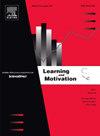Unboxing autonomous motivation, controlled motivation, and oral skills among EFL learners: Insights into gamification through the lens of broaden-and-build theory
IF 1.7
4区 心理学
Q3 PSYCHOLOGY, BIOLOGICAL
引用次数: 0
Abstract
The growing interest in gamification as a pedagogical tool has highlighted its potential to enhance engagement and general language proficiency. However, limited research has specifically investigated its effects on autonomous and controlled motivation, as well as its role in fostering oral skills in EFL contexts. Addressing these gaps, this study draws on the Broaden-and-build Theory to examine the impact of gamification on autonomous motivation, controlled motivation, and oral skills among Chinese EFL learners. Utilizing a pretest-posttest quasi-experimental design, the study involved an experimental group (EG, n = 253) that participated in gamified learning activities and a control group (CG, n = 261) that followed traditional instructional methods. Data were analyzed using independent samples t-tests to compare the groups' performance before and after the intervention. The results revealed that the EG exhibited significantly higher levels of autonomous motivation and oral skill proficiency compared to the CG. Additionally, controlled motivation levels increased among learners in the gamified setting. These findings underscore the potential of gamification to not only promote autonomy but also enhance oral language development in EFL learners. The implications of the study suggest that integrating gamification into language instruction can create more engaging and effective learning experiences, offering valuable insights for educators and curriculum designers aiming to optimize EFL teaching practices.
解析英语学习者的自主动机、控制动机和口语技能:从拓展与构建理论的视角看游戏化
人们对游戏化作为一种教学工具的兴趣日益浓厚,这突显了它提高参与度和一般语言熟练程度的潜力。然而,有限的研究专门调查了它对自主动机和控制动机的影响,以及它在培养英语环境下口语技能的作用。为了解决这些问题,本研究利用“拓展与构建”理论来研究游戏化对中国英语学习者自主动机、控制动机和口语技能的影响。本研究采用前测后测准实验设计,实验组(EG, n = 253)参与游戏化学习活动,对照组(CG, n = 261)遵循传统教学方法。采用独立样本t检验对数据进行分析,比较干预前后各组的表现。结果显示,与CG组相比,EG组表现出更高水平的自主动机和口语技能熟练程度。此外,在游戏化环境中,学习者的可控动机水平有所提高。这些发现强调了游戏化的潜力,不仅可以促进英语学习者的自主性,还可以促进口语的发展。该研究表明,将游戏化融入语言教学可以创造更有吸引力和更有效的学习体验,为旨在优化英语教学实践的教育工作者和课程设计师提供有价值的见解。
本文章由计算机程序翻译,如有差异,请以英文原文为准。
求助全文
约1分钟内获得全文
求助全文
来源期刊

Learning and Motivation
Multiple-
CiteScore
2.90
自引率
0.00%
发文量
53
期刊介绍:
Learning and Motivation features original experimental research devoted to the analysis of basic phenomena and mechanisms of learning, memory, and motivation. These studies, involving either animal or human subjects, examine behavioral, biological, and evolutionary influences on the learning and motivation processes, and often report on an integrated series of experiments that advance knowledge in this field. Theoretical papers and shorter reports are also considered.
 求助内容:
求助内容: 应助结果提醒方式:
应助结果提醒方式:


